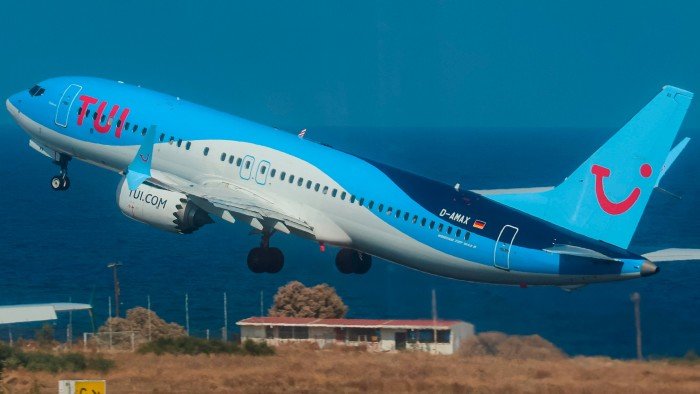Unlock the Editor’s Digest for free
Roula Khalaf, Editor of the FT, selects her favourite stories in this weekly newsletter.
Tui, Europe’s largest travel operator, has outlined plans to sell more seats on other airlines’ aircraft, betting on a “low risk” model to generate growth amid fears of a dent in consumer confidence.
Tui has traditionally sold flights on its own planes or bought seats in bulk from other airlines to sell on to consumers through its package holidays.
But the German group told the Financial Times it would expand so-called “dynamic packaging deals”, having made partnerships with airlines including Ryanair and easyJet in the UK. The arrangements allow consumers to choose from a range of providers’ flights and hotels when booking trips.
Chief executive Sebastian Ebel said he was keen to agree such arrangements with more airlines. He hoped to roll out the approach — similar to those of online travel agents such as Booking.com and Expedia — in the Nordic countries, Spain and the Americas.
Tui’s cautious approach comes as it navigates uncertainty in the travel sector, amid more unstable travel demand.
“The reason why we have been more conservative on the capacity was because we anticipated that there was maybe more risk capacity growth than the market growth,” Ebel said.
There was a “good opportunity” to grow with a low-risk model, he said, pointing out the high costs of growing via its traditional routes.
“If we put another aircraft . . . it’s a €30mn, €50mn investment,” he said.
While few major airlines have reported a dent in demand for travel, there are some signs that customers have become more price-conscious.
In a recent European travel survey by AlixPartners, 67 per cent of consumers said they intended to spend the same amount or more on travel in 2025 than they did in 2024. But almost half of respondents claimed to have less money to spend this year.
Shares in UK travel group Jet2 fell sharply in February after it warned that gloomy consumer sentiment and rising costs might put profit margins in the year ahead “under some pressure”.

Ebel said the conventional wholesale business was “always very attractive” when there was strong demand or in peak seasons. When there was oversupply, he said, dynamic packages were “very good”.
“We needed to have the flexibility in the system that we are not hit if there’s less demand,” he said.
Having its own fleet of aircraft, cruise ships and own-branded hotels was in the past a significant selling point for Tui. However, difficult market conditions during the coronavirus pandemic prompted the company to sell parts of the business that owned the assets, including Hapag-Lloyd Cruises and a minority stake in Riu hotels.
The “dynamic packaging” trend is the latest chapter in the sometimes unhappy story of relationships between budget airlines and travel agents. Ryanair engaged in a years-long row with online travel agents, which it accused of overcharging for its flights and extras such as seat selections.
The number of customers making a trip with Tui’s dynamically packaged holidays was up 18 per cent year-on-year in the three months to December, to 700,000. A fifth of all customers in the period travelled on such packages.

Ebel said he had “good confidence in the market” but acknowledged that trips to Turkey had become “slightly more challenging” because of cost increases and that some customers were choosing cheaper destinations such as Egypt.
Tui shares fell sharply after it revealed on February 11 that bookings for the summer season had slowed down from the previous year.
